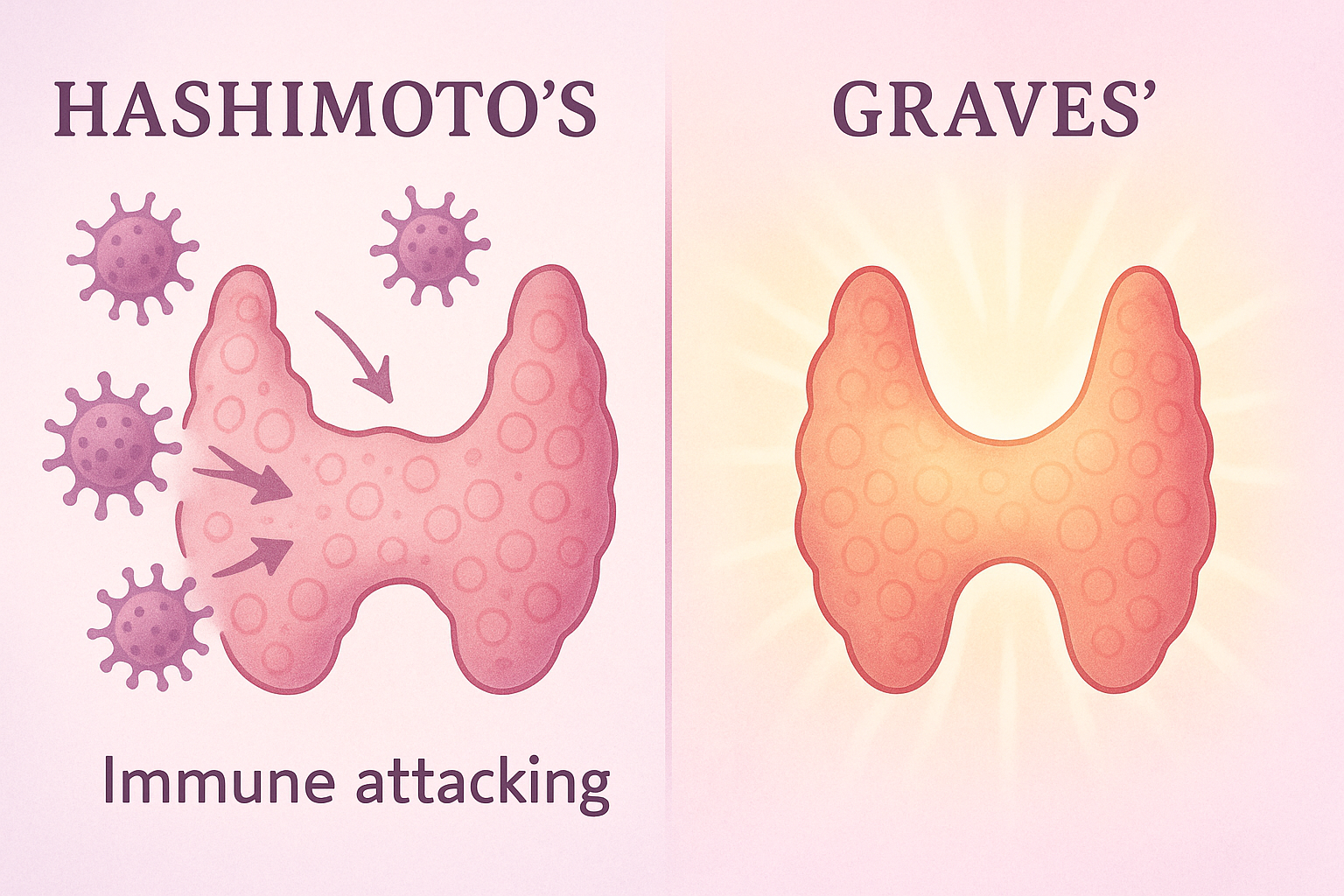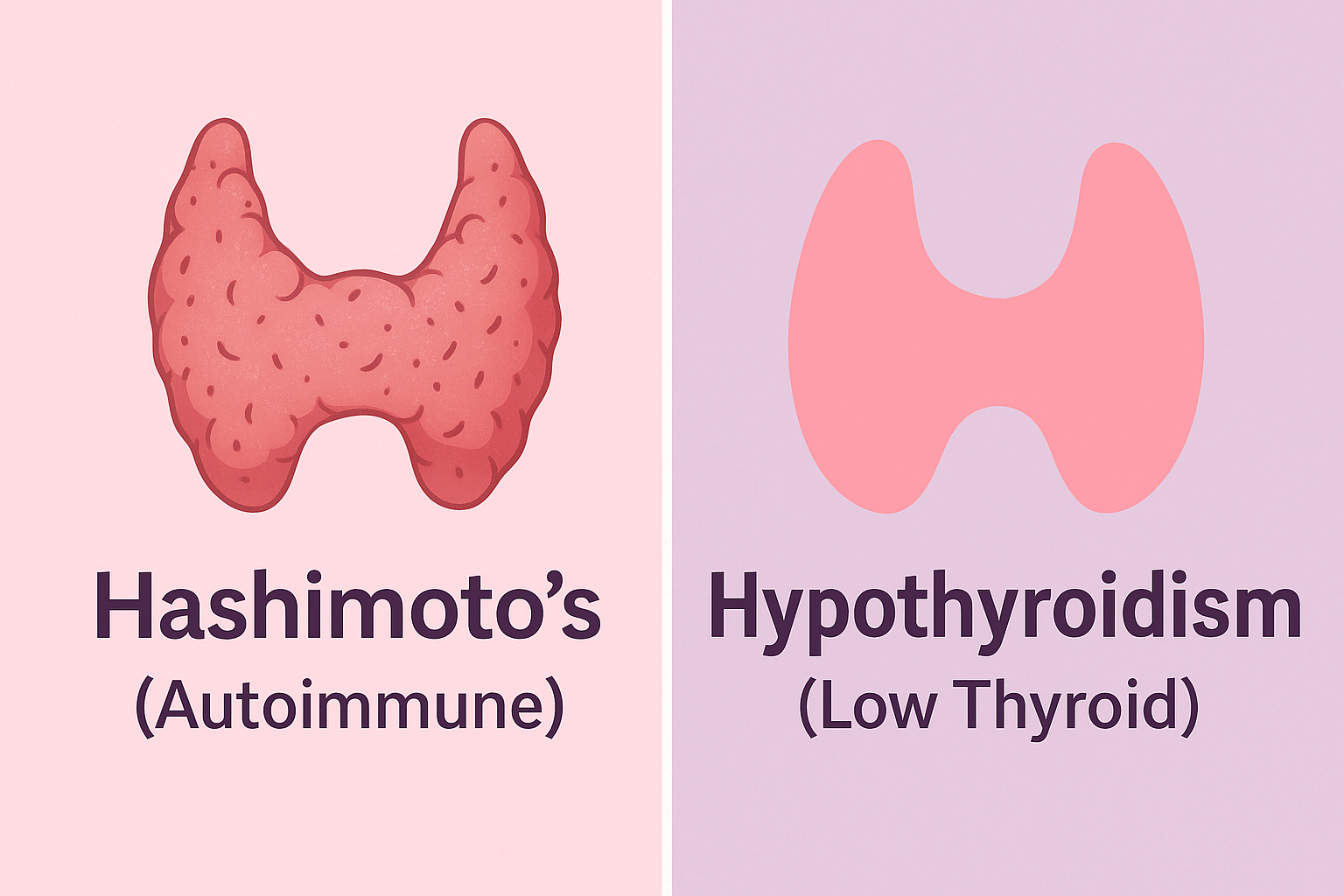Have you ever felt unusually anxious, emotional, or down — yet couldn’t explain why?
It might not be “all in your head.”
It could be your thyroid sending distress signals to your brain.
This small butterfly-shaped gland in your neck has a direct impact on your mental and emotional state.
When thyroid hormones become unbalanced, mood swings, anxiety, or even depression can appear — sometimes long before any physical symptoms.
💡 For background on how your thyroid works, read What the Thyroid Gland Really Does (and Why It’s So Important for Women).
🧠 How the Thyroid Affects the Brain and Emotions
Your thyroid produces the hormones T3 and T4, which regulate the brain’s energy supply.
When levels drop (hypothyroidism) or rise too high (hyperthyroidism), the brain’s chemistry — including serotonin, dopamine, and GABA — is disrupted.
- Low thyroid (T3/T4 deficiency): can slow neurotransmitters, causing fatigue, sadness, and “flat” emotions.
- Overactive thyroid: overstimulates the brain, leading to racing thoughts, restlessness, and anxiety.
In both cases, your brain interprets these chemical changes as mood instability.
🧬 Learn about these hormones in The Connection Between Thyroid Hormones, T3, and T4.
💔 The Emotional Symptoms of Thyroid Imbalance
Women with thyroid disorders often describe emotional turbulence that feels out of character:
| Low Thyroid (Hypothyroidism) | High Thyroid (Hyperthyroidism) |
|---|---|
| Fatigue and apathy | Nervous energy and restlessness |
| Low motivation or depression | Anxiety and panic episodes |
| Emotional numbness | Irritability and mood swings |
| Brain fog and slow thinking | Racing thoughts and insomnia |
Because these symptoms mimic mood disorders, many women are misdiagnosed — or treated only for anxiety or depression while the thyroid remains untested.
🚨 If you relate to these signs, review Signs of an Underactive Thyroid (Hypothyroidism) in Women and Signs of an Overactive Thyroid (Hyperthyroidism) in Women: What You Need to Know.
🌸 Why Women Are More Affected
Women’s hormones — especially estrogen and progesterone — directly influence thyroid sensitivity.
When these fluctuate (during menstrual cycles, postpartum, or menopause), thyroid hormones can swing as well, producing:
- Sudden anxiety before periods
- Tearfulness or irritability mid-cycle
- Postpartum mood changes
- Emotional ups and downs during perimenopause
This hormone feedback loop is why thyroid health is so crucial for emotional stability.
🌿 Explore hormonal support in The Best Thyroid-Friendly Diet for Women.
🔬 The Science Behind the Thyroid-Mood Link
- Low T3 levels reduce serotonin activity (Journal of Psychiatric Research, 2018).
- Hyperthyroidism raises adrenaline and cortisol — fueling anxiety (Endocrine Connections, 2020).
- Treating thyroid dysfunction often improves mood and reduces antidepressant need (Lancet Endocrinology, 2019).
In short: balanced thyroid = balanced mood.
🧘♀️ Natural Ways to Support Mood and Thyroid Balance
1️⃣ Manage Stress and Cortisol
Chronic stress raises cortisol, which blocks T4→T3 conversion and heightens anxiety.
Practice gentle yoga, deep breathing, or evening walks to restore calm.
💆♀️ More tips in How Stress Impacts Your Thyroid (and Natural Ways to Restore Balance).
2️⃣ Feed Your Brain and Thyroid Together
Focus on foods rich in:
- Selenium (Brazil nuts, tuna)
- Zinc (pumpkin seeds, lentils)
- B-vitamins (eggs, fish)
- Omega-3 fats (salmon, chia seeds)
These nutrients help produce both thyroid hormones and mood chemicals.
🥗 See 10 Essential Vitamins and Minerals for a Healthy Thyroid.
3️⃣ Support with Adaptogenic Herbs and Supplements
Adaptogens like Ashwagandha and Schisandra reduce stress and support thyroid hormone conversion.
The supplement Thyrafemme combines these herbs with iodine, selenium, and B12 to naturally balance energy and mood.
🌺 See what research says in Does Thyrafemme Really Work? (What Science Says).
💖 When to Check Your Thyroid
Ask your doctor for a full thyroid panel if you notice:
- Persistent anxiety or irritability
- Sudden mood swings
- Unexplained fatigue or sleep issues
- Weight changes with no diet shift
A comprehensive test (TSH, Free T3, Free T4) can reveal imbalances often missed in basic screenings.
🌙 Final Thoughts
Your emotions are a reflection of your body’s chemistry.
When the thyroid is balanced, the mind feels clear and calm.
When it’s off, your inner world feels like a roller coaster.
By nourishing your thyroid with nutrients, stress management, and natural support from Thyrafemme, you can help restore emotional stability — from the inside out.
💕 A calm mind starts with a balanced thyroid.
❓ FAQ
1️⃣ Can thyroid problems cause mood swings?
Yes — imbalanced thyroid hormones affect neurotransmitters that control mood and emotions.
2️⃣ Why does thyroid imbalance cause anxiety?
Overactive thyroid raises adrenaline and cortisol, triggering restlessness and racing thoughts.
3️⃣ Can low thyroid cause depression?
Yes — low T3 levels reduce serotonin activity, often causing fatigue and low mood.
4️⃣ How do I know if my mood issues are from thyroid imbalance?
If mood changes occur with fatigue, hair loss, or weight fluctuations, get a thyroid test.
5️⃣ How can I naturally calm anxiety from thyroid issues?
Practice stress relief daily and nourish your thyroid with selenium, zinc, and adaptogens like Ashwagandha.
6️⃣ What supplement helps both mood and thyroid?
Thyrafemme — its adaptogenic blend supports thyroid hormone conversion and stress response.
7️⃣ How long until mood improves after balancing thyroid?
Most women see emotional stability return within 4–8 weeks of consistent support.
8️⃣ Does stress worsen thyroid anxiety?
Yes — cortisol disrupts thyroid hormone conversion and amplifies anxiety symptoms.
9️⃣ Can diet help with thyroid-related mood issues?
Absolutely — nutrients like selenium and B vitamins feed both thyroid and neurotransmitters.
🔟 When should I see a doctor?
If mood changes persist for more than two weeks or you experience rapid heart rate, tremors, or extreme fatigue.











